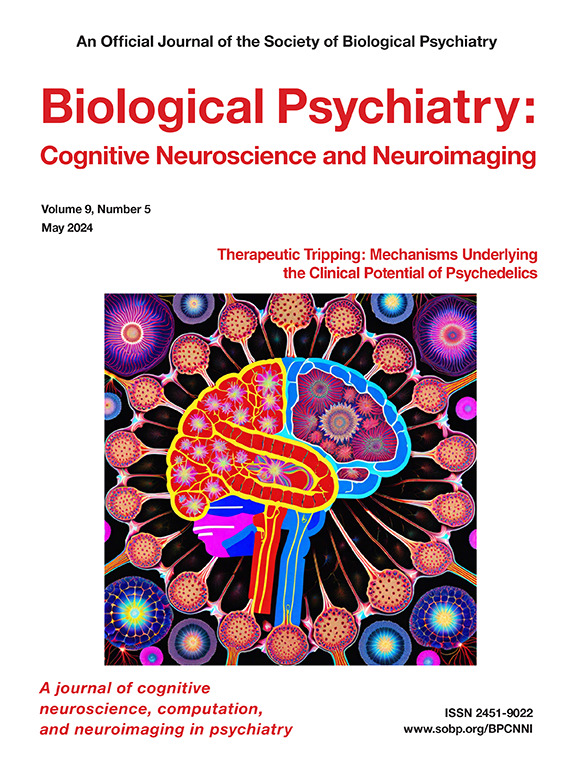Cognitive Profiles in Treatment-Resistant Late-Life Depression and Their Impact on Treatment Outcomes
IF 5.7
2区 医学
Q1 NEUROSCIENCES
Biological Psychiatry-Cognitive Neuroscience and Neuroimaging
Pub Date : 2024-11-01
DOI:10.1016/j.bpsc.2024.07.009
引用次数: 0
Abstract
Background
Late-life depression (LLD) is associated with cognitive impairment, but substantial heterogeneity exists among patients. Data on the extent of cognitive impairments are inconclusive, particularly in patients with treatment-resistant depression (TRD). We investigated the cognitive profiles of patients with treatment-resistant versus nonresistant LLD and aimed to identify distinct cognitive subgroups. We also examined whether cognitive subgroups responded differentially to treatment with bilateral repetitive transcranial magnetic stimulation (rTMS).
Methods
A total of 165 patients with LLD were divided into treatment-resistant and nonresistant groups and compared with healthy control participants on measures of executive function, information processing speed, verbal learning, and memory. Cluster analysis identified subgroups based on cognitive scores. Demographic and clinical variables, as well as outcomes with bilateral rTMS, were compared between cognitive subgroups.
Results
Patients with LLD, particularly TRD, exhibited significantly worse cognitive performance than healthy controls. A 3-cluster solution was found, including cognitively intact (n = 89), cognitively diminished (n = 29), and impaired memory (n = 47) subgroups. Both the cognitively diminished and impaired memory subgroups had more anxiety symptoms and a higher proportion of patients with TRD than the cognitively intact group, although the latter difference did not survive multiple comparison correction. No significant differences were observed in outcomes to rTMS treatment.
Conclusions
Patients with LLD exhibited impairments across cognitive domains, which were more pronounced in TRD. Three cognitive subgroups responded similarly to rTMS treatment, indicating its effectiveness across cognitive profiles, especially when medications are not tolerated. Future research should examine the relationships among cognitive subgroups, cognitive decline, and neurodegeneration.
难治性晚期抑郁症患者的认知特征及其对治疗结果的影响》(Cognitive Profiles in Treatment-Ristant Late-Life Depression and their Impact on Treatment Outcomes.
背景:晚期抑郁症(LLD)与认知障碍有关,但患者之间存在很大的异质性。有关认知障碍程度的数据尚无定论,尤其是在耐药性抑郁症(TRD)患者中。我们研究了耐药性 LLD 患者与非耐药性 LLD 患者的认知概况,旨在确定不同的认知亚群。此外,我们还研究了认知亚组是否对双侧重复经颅磁刺激(rTMS)治疗有不同的反应。方法:165 名 LLD 患者被分为治疗耐受组和非耐受组,并与健康对照组(HC)在执行功能、信息处理速度、言语学习和记忆方面进行了比较。聚类分析根据认知评分确定了亚组。对认知亚组之间的人口统计学和临床变量以及双侧经颅磁刺激的结果进行了比较:结果:LLD患者,尤其是TRD患者的认知表现明显差于HC患者。研究发现了一种三群组解决方案,包括 "认知完整"(89 人)、"认知减退"(29 人)和 "记忆受损"(47 人)亚群组。与 "认知功能完整 "组相比,"认知功能减退 "和 "记忆力受损 "亚组的焦虑症状更多,TRD患者的比例更高,但后者未能通过多重比较校正。经颅磁刺激治疗的结果无明显差异:结论:LLD患者在各个认知领域都存在障碍,这在TRD患者中更为明显。三个已确定的认知亚组对经颅磁刺激治疗的反应相似,这表明经颅磁刺激治疗对各种认知状况都有效,尤其是在不能耐受药物治疗的情况下。未来的研究应探讨认知亚组、认知功能衰退和神经变性之间的关系。
本文章由计算机程序翻译,如有差异,请以英文原文为准。
求助全文
约1分钟内获得全文
求助全文
来源期刊

Biological Psychiatry-Cognitive Neuroscience and Neuroimaging
Neuroscience-Biological Psychiatry
CiteScore
10.40
自引率
1.70%
发文量
247
审稿时长
30 days
期刊介绍:
Biological Psychiatry: Cognitive Neuroscience and Neuroimaging is an official journal of the Society for Biological Psychiatry, whose purpose is to promote excellence in scientific research and education in fields that investigate the nature, causes, mechanisms, and treatments of disorders of thought, emotion, or behavior. In accord with this mission, this peer-reviewed, rapid-publication, international journal focuses on studies using the tools and constructs of cognitive neuroscience, including the full range of non-invasive neuroimaging and human extra- and intracranial physiological recording methodologies. It publishes both basic and clinical studies, including those that incorporate genetic data, pharmacological challenges, and computational modeling approaches. The journal publishes novel results of original research which represent an important new lead or significant impact on the field. Reviews and commentaries that focus on topics of current research and interest are also encouraged.
 求助内容:
求助内容: 应助结果提醒方式:
应助结果提醒方式:


